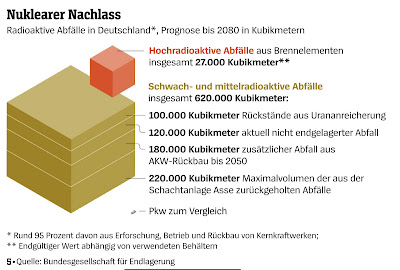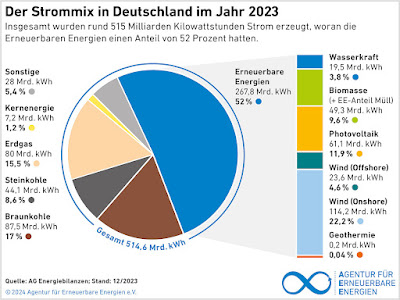This is not the correct ending. Old reactors are phased out, and cheap electricity is no longer available when they die.
Nuclear power from existing plants was one of the cheapest forms of energy to close the acute supply gaps caused by the discontinuation of cheap Russian gas. The variable electricity generation costs for existing nuclear power plants are 20 to 25 euros per megawatt hour. This includes, for example, the costs of fuel rods and the maintenance and operation of the getting-on-in-years plants.
However, we must not forget the so-called hidden costs of nuclear power. It only appears cheaper than green electricity because the massive taxpayer subsidies for nuclear power - in Germany between 1950 and 2010, more than 200 billion euros - are usually not taken into account.

|
| Nuclear heritage in Germany (©Der Spiegel) |
Still, since most of the old nuclear power plants have been written off, their continued operation is tantamount to a license to print money.
The situation doesn't look so bright for nuclear power plants that recently came into operation or those still under construction.
Long construction periods and increased safety requirements are driving up the costs of building new reactors to the extent that the generation costs per megawatt hour now exceed those for green electricity.

|
| ©ZDF |

|
| ©ZDF |
Stanford University professor Mark Z. Jacobson wrote, "Investing in new nuclear power is the surest way to climate disaster." He is assisted by Ben Wealer from the Technical University of Berlin, who succinctly said, "[Nuclear] blocks the cash we need for renewables."
Here is a comparison of energy costs.

|
| ©US Energy |

|
| ©Der Spiegel |

|
| ©AEE |

|
|
Breakdown of the primary energy consumption from fossil fuels,
nuclear, and renewables worldwide (©Energy Institute) |

|
|
Development of nuclear power in Europe. France, in particular, is pushing nuclear energy as a "green" energy (©Der Spiegel) |
*

For a more differentiated view see
ReplyDeleteBuild Nuclear Now .
An April 24, 2024 article started out like this:
"A Micro-Reactor Goes to a Computing Convention
One of the ways that nuclear reactors are different from solar panels, wind turbines, and hydroelectric dams is that comparatively few people have actually seen a reactor."...
I do not know who finances this outfit, but nuclear is just one matter Breakthrough is advocating for.
Everything what is built now is too expensive and all the mini or micro reactors they are planning come too late.
ReplyDelete